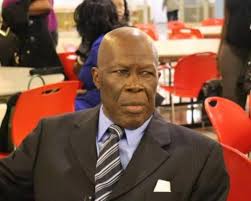June 12 and Nwosu: Could He Have Stopped Military Rule?

The June 12, 1993, presidential election stands as a pivotal moment in Nigeria’s political history. It symbolises both the promise of democratic governance and the challenges it faced. However, the military government led by General Ibrahim Babangida annulled the results, sparking outrage and protests. Babangida recently released his memoir, reigniting discussions about the election’s annulment and its implications.
At the centre of this historic election was Late Prof. Humphrey Nwosu, the Chairman of the National Electoral Commission (NEC), who oversaw the process. The annulment of the election by the military government raises a critical question: Did Nwosu possess the authority to prevent the annulment and counteract military intervention?
The Senate Stance
Senator Enyinnaya Abaribe of Abia South proposed immortalising Nwosu, recognising his contributions to Nigeria’s democratic process. However, the motion faced significant opposition. Deputy Senate President Jibrin Barau, who presided over the session, put the matter to a vote, resulting in its rejection by the majority.
“It is a bit controversial; some see him as someone who truncated June 12, and some see him as a hero of June 12,” said Jibrin. This calls for an understanding of whether there was something Nwosu could have done better.
The Role of an Electoral Commission Chairman
The role of an electoral commission chairman is largely administrative. According to Section 153 of the 1999 Nigerian Constitution, the Independent National Electoral Commission (INEC) is responsible for organising, conducting, and supervising elections. This shows that it has no constitutional power to enforce or defend election results against military or political interference.
During the military era, Nwosu led the National Electoral Commission (NEC), which functioned similarly to INEC but operated under a military government. He introduced the Open Ballot System to curb electoral malpractice. This raises the question: Could Nwosu have done more to save democracy?
He had overseen a credible election, and the annulment was a decision imposed by the military hierarchy, leaving him with limited avenues for resistance.
Conversely, while no electoral chairman has been able to single-handedly “fight” for results to be upheld against strong political or military interference, unlike other key figures who openly condemned the annulment (e.g., MKO Abiola, prominent civil society leaders, and politicians), Nwosu largely avoided public discussions about the event.
Read Also:
Public Officials and Ethical Conduct: What Ezekwesili-Nwebonyi Clash Reveals
Tinubu’s Emergency Declaration in Rivers: Supporters, Opponents, and National Assembly’s Decision
His reluctance to speak on the matter led to speculation that he was either under pressure from the military or chose to distance himself from the controversy for personal safety. After leaving his position as NEC chairman, Nwosu remained largely out of the public eye and did not participate in major democratic struggles that followed, such as the protests against military rule. It was not until 2008, during the administration of President Umaru Musa Yar’Adua, that Nwosu publicly confirmed that MKO Abiola won the June 12 election.
This long delay in addressing the issue further fuelled speculation about the reasons behind his silence.
A Call for a Proper Review
Amid the argument, Mr Jibrin, the Deputy Senate President, advised Mr Abaribe to reintroduce the motion on the next legislative day after the Rules and Business Committee has reviewed it. The Senate must examine all the circumstances surrounding the issue, including the powers an electoral chairman holds during a military regime, before making a decision. Instead of quashing the motion, a thorough review will help the public understand why certain decisions were made.

